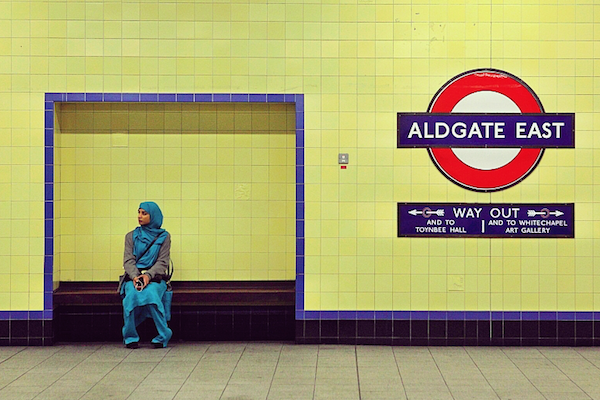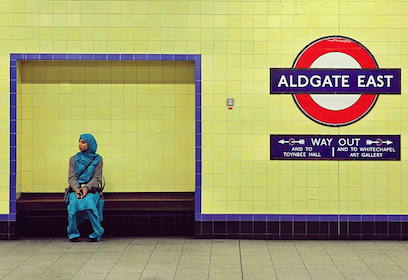
Photo: Roberta Trombetta
Ornella is the Italian bookseller in London. In the most multicultural and energetic European capital city, she runs a bustling shop specializing in Italian literature and society. The place attracts all manner of Italian emigrants, from upper-class ladies and downcast youth to bankers and writers. Ornella usually has a kind word and a reassuring gesture for everyone, especially the young who are living outside of Italy for the first time. But after the June 23 referendum that set the UK on the path to leave the European Union, Ornella has lost her optimism. “I have moments of real depression,” she texted me. “We will get a new Margaret Thatcher at some point.” Such feelings of anxious dread, mingled with a sense of profound uncertainty, are now widespread among the large communities of Europeans living in Britain. In fact, all over Europe, the impact of Brexit has been as much emotional as intellectual, an unshakeable feeling of disquiet and vexation. Wherever I go, even on the idyllic southern coast of the Tyrrhenian Sea and in the hills surrounding Florence, the topic people’s conversations work at again and again, like a splinter, is Brexit.
Since the vote, I have found myself contemplating what for me—a seasoned émigré—is a quite uncustomary question: I cannot help but wonder, “Do they really want me here?” In this I finally have an inkling of how refugees must feel, constantly barraged by the likes of Marine Le Pen and Viktor Orbán, Donald Trump and Geert Wilders, being told over and over you are not wanted here, you are a potential subversive, a radical Islamist, a welfare-state parasite—in sum, you are not and will never be “us.” The experience contains echoes of when some Western governments of the early 1900s fretted about “alien immigration”—by which they meant Eastern European Jews—and of course the ensuing fascists with their scapegoating of Slavs, Roma, and, once more, of Jews. After studying the history of European far-right and nationalist politics for about a decade, I find that I am now living it.
After studying the history of European far-right and nationalist politics for a decade, I find that I am now living it.
After the referendum, with its Leave campaign that stoked and focused anti-immigrant sentiments, many of us now wonder whether it is really worth it to continue living and working in Britain. The answer from at least some Leavers—driven home by the spike in xenophobic violence following the vote—is clear: “Go home!” Yet even the Remain campaign largely failed to articulate any compelling statement of solidarity with Europeans and immigrants. In what began to feel like a contest to out-wonk each other, pro-Remain politicians highlighted numerous technical reasons for staying that almost always missed the big picture: “We want/have to stay because we are Europeans.” The pro-Remain pamphlet distributed by the British government, for example, never so much as mentions common European culture and values. Public debates instead narrowly focused on economic considerations. And forget any mention of the perspectives of non-British Europeans living in the UK. Our views were clearly anathema—as were, it seems, facts.
The public debate leading up to the vote was dominated by sensationalist claims and emotional slogans, a wall of noise through which real evidence barely penetrated. For example, pundits furiously insisted that EU citizens living in Britain are a drain on the system, but research shows that, from 1995 to 2011, EU migrants made a positive fiscal contribution of £20 billion and pay more in taxes than they receive in benefits. Moreover, they confer the benefits of human capital educated abroad, with no previous costs for British taxpayers. And in sectors such as construction where the British educational system fails to provide satisfactory training, Central and Eastern Europeans fill the void.
My own job sector, education, is now in a state of absolute confusion. Before the vote, leading conservative Eurosceptic Daniel Hannan had fantasized wildly about a post-Brexit utopia in which British schools would thrive: “Our universities [will be] flourishing, taking the world’s brightest students and charging accordingly. Their revenues are rising, while they continue to collaborate with research centers in Europe and around the world.” So far the reality has, once more, been very different. As the Times Higher Education reported on June 29, “UK academics could face dwindling chances of winning European research grants following the vote to leave the European Union . . . with some European researchers saying that they would now no longer launch joint applications” for the EU Horizon 2020 funding program (worth €70 billion). An online survey of 167 scientists showed that 51 “had general concerns about the future of science in the UK, 33 said they were planning to leave the country, 20 cited worries about xenophobia, 16 said they had encountered disruption in Horizon 2020 applications and nine were foreign scientists who had decided not to take up UK job offers.” Considering that the Leave campaign’s promises of increased funding for the National Health Services proved ludicrously mendacious, one can safely anticipate that lost EU education funding will never be replaced by any post-Brexit government. Unsurprisingly some of my European/EU colleagues are already receiving job offers from the best European institutions and, I am sure, North American universities will soon follow. The exodus is likely to include British scholars worried about the climate of anti-intellectualism following Brexit, setting up the potential for a British brain drain.
Doubts among prospective students are consequently rising. We are, in fact, facing the possibility of a major reduction in applications from mainland Europe. A recent survey found that 41 percent of overseas students feel less willing to study in the UK due to “concerns about xenophobia and tighter immigration controls.” Foreign Anglophone schools and other northern European institutions (where a good number of postgraduate degrees are offered in English) are probably celebrating. Even prior to Brexit, the atmosphere in Britain had already turned uncertain for many students when Theresa May, then home secretary (now prime minister), implemented stricter rules for international student visas. The tripling of student fees also corresponded with a reduction in the number of students from state-run schools attending college, further lowering educational diversity.
Prospects are very unclear for Europeans living in the UK. Prime Minister May, though weakly in favor of remaining in the EU, nonetheless advocates for a strict approach to immigration. In October 2015, she suggested that the large number of migrants was undermining the social cohesion of the country. Recently May did not rule out the possibility of negotiations about the status of EU citizens currently living in the UK—the insinuation being that they could get the boot. Such an ex post facto application of changes in immigration law would seem to undermine many of the core principles of common law (notably that of lex retro non agit, the non-retroactivity of law). Observers are right to be alarmed by the implications. The disruption caused by such a shift in policy would be enormous, and the very idea—drawn from very old counter-Enlightenment stances, along with a kind of anti-liberalism—has already caused consternation, even among some of the pro-Brexit press.
May’s appointment of senior figures in her government offers no reassurance. “Theresa May brings on the Brexiteers” was the enthusiastic headline in the right-wing isolationist newspaper The Daily Telegraph. Boris Johnson, named foreign secretary, co-authored a letter in the spring that criticized David Cameron for failing to decrease EU immigration, a fault he claimed was “corrosive of public trust in politics.” May’s finance minister, Philip Hammond, previously labeled people migrating from Africa as “marauding migrants,” accusing them of posing a threat to European society. Given this environment, who could blame EU migrants for eventually deciding to leave, if they have the ability. Brexiters had their win, but it looks more like a collective defeat.








